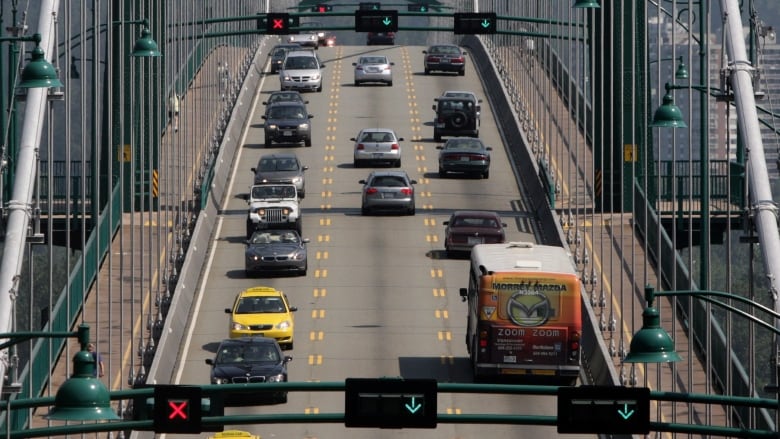Drivers should pay more to drive more, report tells TransLink
Independent body considers distance pricing, fees at congestion points as options for revenue sources

In a few short years, Metro Vancouver drivers could be charged a fee to pass through bustling city centres, access busy roads or — of course — cross bridges.
These so-called "congestion point charges" are one of two options the Mobility Pricing Independent Commission is considering to ease overcrowding on the region's roads and produce revenue to pay for transportation infrastructure.
The independent commission is tasked with recommending options for mobility pricing to TransLink and the Mayors' Council overseeing Lower Mainland transportation services.
"It's about charging just enough to get a small number of people to think about choosing a different route or choosing a different mode or driving at a different time," the commission's executive director Daniel Firth told reporters during a technical briefing Monday.
"But the majority of people will carry on paying."
The report on the first phase of its mission, released Tuesday morning, suggests the possibility of enacting a fee to enter areas like downtown Vancouver, similar to charges in some European cities. Commuters could also be charged for passing through a tunnel or across certain bridges.

The report also looks at a second possibility: charging drivers based on the distance travelled, with higher fees for certain locations and times of day.
But it acknowledges that, even though the commission has studied systems used by cities around the world, no other jurisdiction has tried charging different amounts for distance travelled based on the time of day and geography. Firth, however, said the technology to make that possible is "on the horizon."
To date, the commission has consulted more than 6,000 Metro Vancouver residents about their traffic frustrations and concerns about how to make mobility pricing fair for everyone.
When members of the independent group began meeting last summer, they had a list of 10 possible approaches to the problem, but narrowed those down to two they believe would best address the needs of commuters.
"Whatever is implemented needs to be affordable, it needs to be considering fairness and it particularly needs to be looking at ensuring there are adequate transportation alternatives or transportation options for different kinds of trips," Firth said.
Questions remain
The commission says it isn't endorsing one option over the other, and there are still several problems to tackle before it makes a final recommendation.
One of those problems is privacy: How much information will governments collect about the movements of ordinary citizens through a mobility pricing system?
That's a wrinkle that's under discussion, according to the commission's chair, Allan Seckel.
"It's an issue the commission has been very mindful of and discussed several times … and the final report will address privacy concerns," he said.

Another open question is how to create a system that recognizes the difficulties faced by people who cannot afford to live in the expensive cities where they work, and whose homes are far from public transit routes.
"That's one of the difficult issues that lies ahead for us," Seckel acknowledged.
The commission's final report is due in April. Before then, the plan is to conduct public meetings and hold stakeholder workshops, and the commission's website will open to online comments next month.
But of course, whether any mobility pricing system becomes a reality for Metro Vancouver depends on the will of political leaders to make change, something that could be particularly tricky in a municipal election year.
"It's out of our hands," Seckel acknowledged.